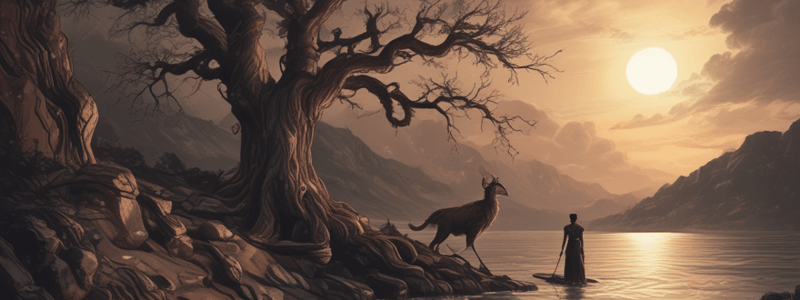Podcast
Questions and Answers
What is the tone of the Duke's description of his late wife at the beginning of the poem?
What is the tone of the Duke's description of his late wife at the beginning of the poem?
- Joyful and celebratory
- Angry and resentful
- Indifferent and uncaring
- Wistful and respectful (correct)
Why did the Duke suspect his wife of infidelity?
Why did the Duke suspect his wife of infidelity?
- She did not like her portrait
- She spent too much time with Fra Pandolf
- She was too easily impressed by others (correct)
- She was too happy
What happened to the Duke's first wife?
What happened to the Duke's first wife?
- She died of natural causes
- She was exiled by the Duke
- She ran away with another man
- She was murdered by the Duke (correct)
What is the Duke planning to do next?
What is the Duke planning to do next?
What is the subject of the poem 'The Love Song of J.Alfred Prufrock'?
What is the subject of the poem 'The Love Song of J.Alfred Prufrock'?
What is the tone of the speaker's voice in 'The Love Song of J.Alfred Prufrock'?
What is the tone of the speaker's voice in 'The Love Song of J.Alfred Prufrock'?
What is the main theme of the poem 'My Last Duchess'?
What is the main theme of the poem 'My Last Duchess'?
What is the form of the poem 'My Last Duchess'?
What is the form of the poem 'My Last Duchess'?
What is the speaker's attitude towards the people around him in 'The Love Song of J.Alfred Prufrock'?
What is the speaker's attitude towards the people around him in 'The Love Song of J.Alfred Prufrock'?
What is the role of the Duke's guest in 'My Last Duchess'?
What is the role of the Duke's guest in 'My Last Duchess'?
Flashcards
Duke's tone in 'My Last Duchess'
Duke's tone in 'My Last Duchess'
The Duke's description of his deceased wife is filled with longing and reverence.
Duke's suspicion in 'My Last Duchess'
Duke's suspicion in 'My Last Duchess'
The Duke's suspicions are fueled by his belief that his wife easily admired others, suggesting infidelity.
Fate of the Duke's first wife
Fate of the Duke's first wife
The Duke murdered his first wife, indicating his extreme jealousy and possessiveness.
The Duke's next move
The Duke's next move
Signup and view all the flashcards
Subject of 'The Love Song of J.Alfred Prufrock'
Subject of 'The Love Song of J.Alfred Prufrock'
Signup and view all the flashcards
Tone of 'The Love Song of J.Alfred Prufrock'
Tone of 'The Love Song of J.Alfred Prufrock'
Signup and view all the flashcards
Main theme of 'My Last Duchess'
Main theme of 'My Last Duchess'
Signup and view all the flashcards
Form of 'My Last Duchess'
Form of 'My Last Duchess'
Signup and view all the flashcards
Prufrock's perception of others
Prufrock's perception of others
Signup and view all the flashcards
Role of the Duke's guest
Role of the Duke's guest
Signup and view all the flashcards
Study Notes
Definition of Dramatic Monologue
- A speech delivered by a single character in various literary forms such as stories, plays, or poetry.
- Can be directed towards other characters or the audience.
- Connects to the dramatic arts despite not requiring particularly dramatic subject matter.
Types of Dramatic Monologues
-
Romantic Monologues: Focus on characters' romantic feelings and relationships; common in plays and poetry.
- Example: Mr. Knightley’s love confession in Jane Austen's Emma.
-
Conversational Monologues: Longer speeches that are part of broader conversations, usually not about romantic confessions.
- Example: "The Eolian Harp" by Samuel Taylor Coleridge.
-
Philosophical Monologues: Discusses personal philosophy or complex topics.
- Example: "Democracy in America" monologue in Tony Kushner's Angels in America.
Features of Dramatic Monologues
- Must be delivered by a single speaker; minimal interruptions are allowed.
- Offers insight into character's intentions, perspectives, and inner thoughts.
- Not limited to specific subjects but should fulfill a narrative purpose, enhancing audience understanding.
- Typically longer than regular conversational speech in order to emphasize the speaker.
Examples of Dramatic Monologues
- Recognized mainly from plays but can also be found in poetry and other literary works.
- Notable examples occur in Romeo and Juliet by William Shakespeare, particularly in Romeo’s balcony monologue expressing deep affection for Juliet.
Notable Monologue
- Romeo’s romantic monologue illustrates his passionate love for Juliet during Act II, Scene II, showcasing his admiration and longing.
- Emphasizes a heartfelt expression rather than a performance to impress.
Important Poetic Example
- "My Last Duchess" by Robert Browning is a famous poem that exemplifies the use of dramatic monologue, expanding its definition within poetry.
Studying That Suits You
Use AI to generate personalized quizzes and flashcards to suit your learning preferences.




